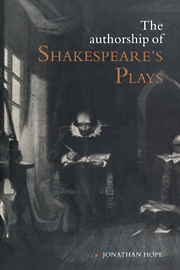6 - The Shakespeare apocrypha
Published online by Cambridge University Press: 17 August 2009
Summary
The 1664 folio plays
This section considers the plays which were added to the second issue of the third Shakespeare folio (first issue 1663, second issue 1664): Pericles, The London Prodigal, Thomas Lord Cromwell, Sir John Oldcastle, The Puritan, A Yorkshire Tragedy, and Locrine.
Pericles
Pericles was first published in 1608 as ‘By William Shakespeare’, but did not appear in the 1623 first folio. By the time it appeared in the third folio it had gone through six quarto editions. The text we have is highly problematic, and is almost certainly a memorial reconstruction – which of course raises problems for the application of linguistic evidence. Taylor (Wells et al. 1987:558) suggests that the reconstruction may have been by George Wilkins, alleged to have collaborated on the play with Shakespeare.
Much recent stylometric work on Pericles has tended to strengthen the case for Wilkins as the author of the early part of the play (Chorus 1 to scene 2.05 in the Arden edition), and Shakespeare of the later part (chorus 3 to Epilogue) – see Smith 1987, 1988, 1989, 1992; Jackson 1991, 1993a, 1993b; Wells et al. 1987:130 (who doubt Shakespeare's presence in the Epilogue and their scene 18); caution and dissent are sounded by Merriam (1992b) and Sams (1991) respectively. For this reason I include here figures for auxiliary ‘do’ use and relative marker choice from Wilkins' only unaided play, The Miseries of Enforced Marriage.
- Type
- Chapter
- Information
- The Authorship of Shakespeare's PlaysA Socio-linguistic Study, pp. 106 - 146Publisher: Cambridge University PressPrint publication year: 1994



